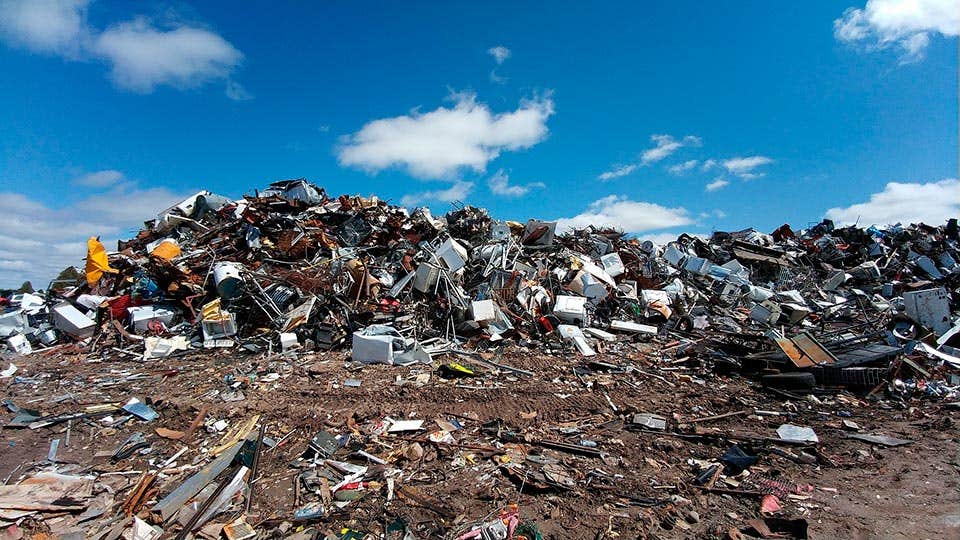Breakthrough innovation converts e-waste into valuable rare earth metals
Researchers discover a surprisingly simple method for efficiently separating and recovering the rare earth metal europium from complex mixtures including other rare earth metals.

Researchers discover a surprisingly simple method for efficiently separating and recovering the rare earth metal europium from complex mixtures including other rare earth metals. (CREDIT: InterConnection)
Rare earth metals are not as rare as their name suggests, but they are crucial for today's economy. These 17 metals are essential for digitalization and the energy transition. Found in smartphones, computers, screens, and batteries, they enable electric motors to run and wind turbines to turn. Europe, however, relies almost entirely on imports from China for these critical raw materials.
The extraction of rare earth metals poses significant challenges. These metals always occur in compound form in natural ores, and because they are chemically similar, separating them is difficult. Traditional processes are chemical- and energy-intensive, requiring several extraction steps, making the process expensive, resource-consuming, and harmful to the environment.
"Rare earth metals are hardly ever recycled in Europe," says Victor Mougel, a professor at ETH Zurich's Laboratory of Inorganic Chemistry. Mougel's team aims to change this. "There is an urgent need for sustainable and uncomplicated methods for separating and recovering these strategic raw materials from various sources," he explains.
In a study published in Nature Communications, Mougel's team introduces a surprisingly simple method to efficiently separate and recover the rare earth metal europium from complex mixtures, including other rare earth metals.
Marie Perrin, a doctoral student in Mougel's group and the study's first author, highlights the inefficiency of current separation methods, which rely on hundreds of liquid-liquid extraction steps.
"The recycling of europium has so far been impractical," she says. Their study demonstrates how a simple inorganic reagent can significantly improve separation, allowing them to obtain europium in a few simple steps and in quantities at least 50 times higher than previous methods.
Related Stories
The key to this technique lies in small inorganic molecules featuring four sulfur atoms around tungsten or molybdenum, known as tetrathiometallates. The researchers drew inspiration from proteins, where tetrathiometallates are found as a binding site for metals in natural enzymes and are used as active substances against cancer and copper metabolism disorders.
For the first time, tetrathiometallates are being used as ligands for separating rare earth metals. Their unique redox properties reduce europium to its unusual divalent state, simplifying its separation from other trivalent rare earth metals.
Electronic waste is an important but underutilized source of rare earth metals. "If this source were tapped into, the lamp waste that Switzerland currently sends abroad to be disposed of in a landfill could be recycled here in Switzerland instead," says Mougel. In this way, lamp waste could serve as an urban mine for europium, reducing Switzerland's dependence on imports.
Europium was once primarily used as phosphor in fluorescent lamps and flat screens, leading to high market prices. With fluorescent lamps being phased out, demand has dropped, making previous recycling methods economically unviable. However, more efficient separation strategies could help utilize the vast quantities of cheap fluorescent lamp waste, which has a rare earth metal content around 17 times higher than natural ores.
Recovering rare metals at the end of a product's life and keeping them in circulation is increasingly urgent. The recovery rate of rare earth elements in the EU is still below one percent. Any separation process for rare earth metals can be used for both extraction from ore and recovery from waste.
Mougel's team focuses on recycling raw materials, which makes more ecological and economic sense. "Our recycling approach is significantly more environmentally friendly than all conventional methods for extracting rare earth metals from mineral ores," says Mougel.
The researchers have patented their technology and are in the process of founding a start-up called REEcover to commercialize it. They are currently working on adapting the separation process for other rare earth metals, such as neodymium and dysprosium, which are found in magnets. If successful, Perrin plans to build up the start-up after her doctorate and establish practical recycling of rare earth metals.
While rare earth metals are essential for modern technology, their extraction poses significant environmental and economic challenges. Innovative methods like those developed by Mougel's team offer promising solutions for more efficient and sustainable recycling, reducing dependency on imports and minimizing environmental impact.
By tapping into sources like electronic waste, we can keep these valuable metals in circulation and support a greener, more resilient economy.
Note: Materials provided above by the The Brighter Side of News. Content may be edited for style and length.
Like these kind of feel good stories? Get the Brighter Side of News' newsletter.
Joshua Shavit
Science & Technology Writer | AI and Robotics Reporter
Joshua Shavit is a Los Angeles-based science and technology writer with a passion for exploring the breakthroughs shaping the future. As a contributor to The Brighter Side of News, he focuses on positive and transformative advancements in AI, technology, physics, engineering, robotics and space science. Joshua is currently working towards a Bachelor of Science in Business Administration at the University of California, Berkeley. He combines his academic background with a talent for storytelling, making complex scientific discoveries engaging and accessible. His work highlights the innovators behind the ideas, bringing readers closer to the people driving progress.



